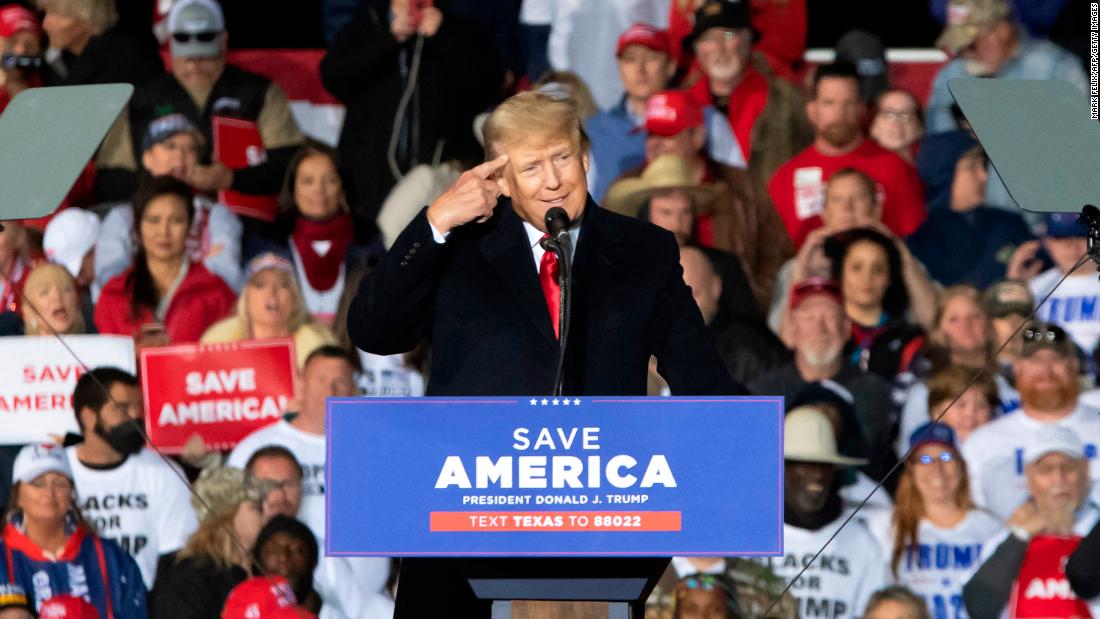
His comments — both at a campaign-style rally in Texas on Saturday and in a Sunday evening statement — drew some rare GOP pushback but also underscored the legal and political challenges Trump faces more than a year after his 2020 election loss.
Here’s what you need to know:
What did Trump say?
January 6. Trump said at his Texas rally that he would consider pardoning those who were charged in connection with the deadly January 6, 2021, attack on the US Capitol if he wins the White House again.
“If I run and if I win, we will treat those people from January 6 fairly. We will treat them fairly,” Trump said. “And if it requires pardons, we will give them pardons. Because they are being treated so unfairly.”
Some of Trump’s allies in Congress have pleaded for pardons for rioters. And Florida Gov. Ron DeSantis, a potential 2024 Republican presidential contender, recently called one-year commemorations of the Capitol riot an effort to “smear” Trump’s supporters.
“It’s a disgrace. It’s a disgrace,” Trump said of the prosecutions and prison sentences rioters have faced.
The Department of Justice has charged more than 700 in connection with the attack on the Capitol.
Financial and elections probes. The former President also used the speech to rail against New York prosecutors’ investigations into his business empire, calling for “the biggest protests we have ever had” if the prosecutors “do anything wrong or illegal.”
New York Attorney General Letitia James earlier this month laid out details of what her office believes to be “misleading or fraudulent” financial statements. And Manhattan District Attorney Alvin Bragg has vowed to personally focus on a probe into Trump’s business practices. Both prosecutors — whom Trump called “racists” — are Black, and neither has faced credible accusations of misconduct.
“These prosecutors are vicious, horrible people. They’re racists, and they’re very sick — they’re mentally sick,” Trump said. “They’re going after me without any protection of my rights from the Supreme Court or most other courts. In reality, they’re not after me, they’re after you.”
Trump also alluded to the potential legal peril he’s facing in Fulton County, Georgia, where District Attorney Fani Willis has been granted a special grand jury to examine his attempt to overturn Joe Biden’s 2020 win in the state.
In a sign of the potential impact of Trump’s incitement, Willis wrote to the FBI on Sunday asking for an immediate risk assessment for the Fulton County Courthouse and government buildings.
Election lies. In a Sunday evening statement, Trump said that he wanted then-Vice President Mike Pence to overturn the 2020 presidential election, repeating the false claim that Pence had the power to do so and slamming recent bipartisan efforts to reform the Electoral Count Act.
The former President falsely claimed that a bipartisan group of lawmakers working to reform the Electoral Count Act proves his claim that Pence had the power, according to the ECA, to overturn the 2020 election. Though the Act is vague, it is clear the role of the vice president is ceremonial and does not include the power to overturn the result of a presidential election.
“Actually, what they are saying, is that Mike Pence did have the right to change the outcome, and they now want to take that right away. Unfortunately, he didn’t exercise that power, he could have overturned the Election!” Trump falsely claimed.
How is Washington reacting?
Trump’s suggestion that he could pardon participants of the January 6 attack in particular drew sharp backlash from lawmakers, including some Republicans.
One of Trump’s closest allies, Sen. Lindsey Graham, dismissed the promise of pardons in an appearance on CBS’s “Face the Nation” on Sunday. “I think it’s inappropriate. I don’t want to reinforce that defiling the Capitol was OK. I don’t want to do anything that would make this more likely in the future,” the South Carolina Republican said.
Republican Gov. Chris Sununu of New Hampshire said similarly on iSunday, “The folks that were part of the riots and, frankly, the assault on the US Capitol, have to be held accountable. There is a rule of law.”
“I don’t care whether you were part of burning cities in Antifa in 2020 or storming the Capitol in 2021, everybody needs to be held fairly accountable across,” he told CNN’s Dana Bash on “State of the Union,” appearing to refer to violence tied to racial justice protests in 2020.
“They shouldn’t be pardoned?” Bash asked, referring to the Capitol rioters.
“Of course not. Oh my goodness, no,” Sununu said.
Trump’s comments also drew criticism from Maine’s Susan Collins, who was one of seven GOP senators who voted to convict Trump in his second impeachment trial for his role in inciting the insurrection.
“I do not think the President should have made … that pledge to do pardons,” she told ABC News on Sunday. “We should let the judicial process proceed. January 6 was a dark day in our history.”
Additionally, White House Press Secretary Jen Psaki said Trump’s comments served as “a reminder of how unfit he is for office.”
“So, in terms of the former President, his actions represent a unique and existential threat to our democracy, as the President has said many times,” Psaki told reporters at Monday’s press briefing.
“But you know, his remarks this weekend, he defended the actions of his supporters who stormed the Capitol and brutally attacked the law enforcement officers protecting it. I think it’s important to shout that out and call that out. He even attacked his own vice president for not in his words, having overturned the election,” she added.
What did Trump say about 2024?
While Trump did not explicitly say he will run for President in 2024 — doing so would trigger a series of legal and campaign finance requirements — he vowed, “We are going to take back the White House.”



